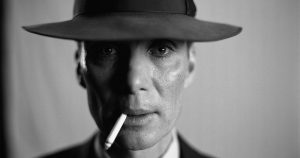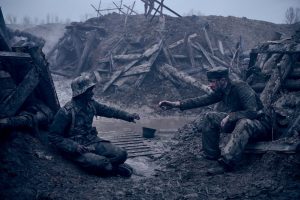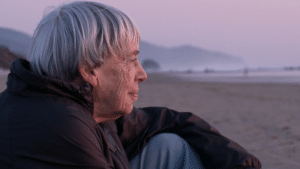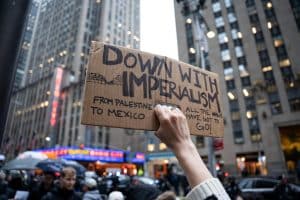I know full well now
Only my own hands,
Dark as the earth,
Can make my earth-dark body free.
O, thieves, exploiters, killers,
No longer shall you say
With arrogant eyes and scornful lips:
You are my servant,
Black man
I, the free!’
Langston Hughes, A New Song
It was 1933. The Soviet Union was 16 years old. Lenin had died nine years earlier and Stalin had nearly completely consolidated power. Trotsky was living in exile in France. Several other prominent members of the Left Opposition were deported to the farthest corners of the country. Within three years, the Moscow Trials and the Great Purge would be underway. Hundreds of thousands would be executed by the regime, including nearly all of the leaders of the October Revolution. Stalin and the bureaucratic clique around him were taking apart, piece by piece, the many advances of the revolution. Abortion was outlawed and restrictions were placed on the right to divorce. Nevertheless, the working class, women, and oppressed groups still hung on to several of the gains they courageously won in the areas of education, culture, and democratic rights.
Five thousand miles away in the American South, Jim Crow was at its peak. Black people were already segregated in virtually every aspect of life and new laws were being enacted each year to further restrict them from spaces designated as white only—everywhere from public parks to schools and boxing matches. An estimated 28 Black people throughout the South were lynched that year. One of the victims was Elizabeth Lawrence, a Black high school teacher in Birmingham, Alabama. On her walk home from school, she was harassed by white students, who threw rocks at her and insulted her. Lawrence reprimanded the students. That night, a white mob entered her home and lynched her. Her house was burned to the ground.
The violence, abject poverty and semi-slavery in the Jim Crow South led to hundreds of thousands of Black families traveling north in what would come to be known as the Great Migration. Black neighborhoods quickly grew in cities like New York, Chicago, and Detroit. It was in these cities, and particularly in New York’s Harlem neighborhood, that Black artists—poets, writers, painters, and musicians—began to flourish.
One of the era’s most brilliant artists was Langston Hughes, a poet, novelist, and playwright from Joplin, Missouri who made his way to New York as a young adult. By 1933, at the age of 31, he had published two anthologies of poetry and his first novel, Not Without Laughter. He would one day be known as the Poet Laureate of Harlem.
Hughes had been captivated by the Soviet Union and the Bolshevik Revolution since he was a boy. He would go on to write poetry in praise of Lenin and the promise of a socialist society. He saw the work of committed communists to free the Scottsboro Boys, nine Black teens in Alabama falsely accused of the rape of a white woman and convicted in a show trial that was denounced around the world. Hughes’s anger at the frame up is evident in Scottsboro Limited, a collection of poems and a play in verse he published about the case.
From Harlem to the Soviet Union
1933 was the year that the USSR invited Hughes along with author Dorothy West, activist Louise Thompson, and several other Black artists, intellectuals, and students to the USSR. The Soviet Union had plans to produce a propaganda film entitled “Black and White,” which would portray the experiences of Black people in the segregated South. Hughes and his companions were to be the cast. Though written out of a “concern for racial freedom and decency,” says Hughes, the script was filled with “faulty facts” and was “improbable to the point of ludicrousness.” Hughes insisted on a near complete rewrite of the film, which would take into account the realities of Black people in the U.S.
The film was later abandoned without official explanation. Several members of the cast believed that Stalin agreed to end state propaganda directed toward Black Americans in exchange for US recognition of the Soviet Union. But the visit by Hughes and his colleagues would help to shape the way Black Americans came to see the USSR and in it, the promise of a new society.
Hughes describes his time in Moscow in his autobiography I Wonder As I Wander. In the Soviet capital, he estimates there to be only a half dozen Black residents but he feels no hostility because of his race. Rather, he finds the Soviet people to be sympathetic and welcoming of Black visitors. “On a crowded bus,” he says “nine times out of ten, some Russian would say, ‘Negrochanski tovarish— Negro comrade—take my seat!’…On the streets queuing up for newspapers, for cigarettes, or soft drinks, often folks in the line would say, ‘Let the Negro comrade go forward.’ If you demurred, they would insist, ‘Please! Visitor to the front.’”
The Russian Revolution put the need for solidarity with oppressed communities on the agenda and Russians were, generally speaking, familiar with the struggle of Blacks for equality in the U.S. They were knowledgeable about the Scottsboro case too, as Hughes recounted in his memoir. Prior to the visit of Hughes and his colleagues, other prominent Black American artists like singer and actor Paul Robeson, singer Marian Anderson, and poet Claude McKay visited the Soviet Union. Lenin took up the issue of Black oppression on several occasions and in 1920, invited journalist John Reed to speak on the so-called “Negro Question” in the U.S. at the Second Congress of the Communist International.
Racialized oppression was not foreign to the country, however. Hughes saw many parallels between the historical experiences of Black people in the U.S. and oppressed nationalities, particularly Muslims, in the former Russian Empire. The Uzbek people, Hughes notes “had been treated by the Russians as Negroes are treated in Mississippi. Before the Soviet revolution in Tashkent, there had even been a Jim Crow section for Asiatics on streetcars. The old partitions were still there now, but segregation itself had gone since the Uzbeks control the affairs of their autonomous republic.”
Journey To Central Asia
After the production of Black and White was cancelled, Hughes remained in the USSR and traveled to the Muslim-majority Soviet republics in order to see firsthand “those regions where the majority of colored citizens lived.” He described his experiences in his highly illuminating pamphlet A Negro Looks at Soviet Central Asia. Hughes began his journey on the Moscow-Tashkent express, a Soviet train heading southeast toward Kazakstan, Uzbekistan, and Turkmenistan—largely Muslim regions which had been conquered and colonized under Tsarism. He was immediately struck by the differences traveling as a Black man in the USSR and in his native country. In the Soviet Union, he experienced no discrimination for the color of his skin and he sees whites and nonwhite citizens freely working and studying together and exchanging as comrades. In the U.S., in contrast, discrimination and harassment toward Blacks was inescapable on trains, buses and nearly everywhere else.
In the South there are Jim Crow cars and Negroes must ride separate from the whites, usually in a filthy antiquated coach next to the engine, getting all the smoke and bumps and dirt. In the South we cannot buy sleeping car tickets. Such comforts are only for white folks. And in the North where segregated travel is not the law, colored people, nevertheless have several difficulties. In auto busses they must take the last seats in the rear, over the wheels. On boats, they must occupy the worst cabins.
It is on this train that Hughes met a factory worker, whom he describes as “a man almost as Brown as I am. A young man dressed quite ordinarily in a pair of tan trousers and a nondescript coat.” Hughes is surprised to learn that the man, named Kurbanov, is in fact, the chairman of the Bukhara soviet. How unlike the U.S. in the early 1930s, in which Black politicians were still uncommon across the U.S. and in the South, says Hughes, a Black mayor was unheard of. On the train, Kurbanov describes how the revolution upended society in the Uzbekistan region:
Before the Revolution, emirs and khans, mullahs and beys. After the Revolution, the workers in power.
An Education System for The People
Hughes was particularly impressed by the Soviet education system. Everywhere he saw signs of a new commitment to learning. Free public schools replaced parochial and private schools for the rich. Schooling was provided in the native languages of students. There were schools in Farsi, in Kazak, and in dozens of other languages, where once Russian was the only language in schools and schools were closed to the peasantry. Night schools have been opened for workers. There are schools within the army barracks for members of the Red Army. In Uzbekistan, the literacy rate jumps from one percent to fifty percent in less than a decade.
Even in the most isolated regions of the country schools, colleges, scientific institutions, and even film schools were opened. “There are colleges of pedagogy, commerce, science, transport, veterinary treatment. There are special research institutes with laboratories of bacteriology, mineralogy, and botany for graduate students,” Hughes notes. The majority of teachers were native to the regions in which they taught. They were given leave during the summers during which time they were paid to further their studies.
Throughout his account, Hughes notes the differences in education for oppressed people in the Soviet Union with education in the US. In the American South, Black students rarely remained in school past primary level. Black schools were generally overcrowded, dilapidated, and sorely lacking in books and materials. In Alabama, says Hughes, the state spent eight times more on white children than it does on Black children. During the months when cotton was harvested, Black children left school to work alongside their families in the fields. Higher education was virtually out of the question for poor Blacks.
The Revolution in The Lives of Women
Hughes was also struck by the advances for women in the Soviet Union. Girls studied alongside boys, women alongside men. In his visit to a Turkmen school, he notes how among the faculty, there were several women teachers, “a remarkable thing in a land where a decade ago, women neither taught nor received teaching.” He tells the story of a woman in Tashkent, Halima Kasakova, who was illiterate until the age of forty but now who, following the revolution, worked as a translator, assisting foreign engineers on some of the region’s most important construction works.
These advances were not limited to education but included culture too. He describes seeing a folk dancer, Tamara Khanum, who was the first woman to perform on a public stage in Uzbekistan. Prior to the Revolution, “dancing, like most other joys in life, belonged only to the males.” Moreover, the performances were often exclusively for the elite. After the Revolution, they were held in the open, for all to enjoy. But female performers were still in danger and had to perform under the watch of a guard. Violence and even the kidnapping of dancers by reactionary forces was still a real possibility.
Stalinism Turns Its Back on Black Liberation
As Jimena Vergara and Julia Wallace note in their article, Black Liberation and the Early Communist Movement, in the early 1930s Stalin zigzagged from ultra-leftism to opportunism as it put forward the strategy of the Popular Front. In the Communist Party USA, “this implied subordinating the party to the government under the Roosevelt administration.” Thousands of Black members saw a betrayal in the Communist Party leadership’s adaptation to American patriotism, which had only ever meant oppression and terror for Black people. After many years in which rank-and-file CPUSA members led difficult and dangerous work for Black liberation—particularly in the American South—the party began to lose its legitimacy among Black workers.
Ultimately, Hughes failed to recognize the duplicity of Stalinism during these critical years, even while his colleagues saw the signs clearly. When the Soviet production company failed to produce Black and White after making a deal with Washington, for example, many members of the cast denounced “the Soviet betrayal of the Negro race.” Hughes, in contrast, remained uncritical of the regime in this period and would even later sign a declaration in support of the Moscow show trials.
Hughes’s perspective toward religion in his account also tended to reflect the bureaucratic Stalinist line in these years. In Bukahara, “All the old minarets and walls and hovels will be torn down and…a new modern city will be built” he says with excitement. “Religion has gone into a museum and out of the world.” It is a perspective that contradicts the position of Lenin and the early Soviet leaders. After the Bolshevik Revolution, tsarist restrictions on the practice of Muslim traditions were removed. Education in madrassas was widespread and many courts administered justice according to Islamic law. Stalinism, however, brought back the suppression of these traditions. Women were prohibited from wearing headscarves and in 1938, the Russian language was made compulsory in public schools.
In the early 1940s, Hughes turned away, not only from support for the Soviet Union, but from political work entirely. The Stalin-Hitler Pact of 1941 led him—along with countless other socialists—to lose faith in the USSR as a beacon for the international working class. Nevertheless, his accounts of his travels in the Soviet Union in the 1930s provide an insight into the revolutionary society that could have been.











